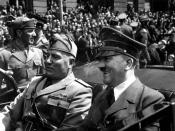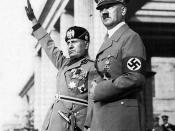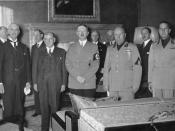What Was The German Foreign Policy From 1933 ~ 1938 When Hitler came in to power of Germany in the early 1930's, he had many ambitions to make Germany a stronger and more independent country. Britain originally misunderstood Hitler's aims for Germany but it soon became apparent that he had higher ambitions than uniting German-speaking people, Independence and a reversal of the "ÃÂTreaty of Versailles'.
Hitler began to fulfil his ambitions for Germany by improving the military powers. He secretly gave orders for a new German Air force to be established and to make more weaponry for Germany's army, both of these orders that Hitler gave were forbidden by the "ÃÂTreaty of Versailles'. He also managed to increase the army from 100,000 men (the maximum amount allowed by the "ÃÂTreaty of Versailles') to 300,000 men and built 2 "ÃÂpocket battleships' and 6 submarines (The "ÃÂTreaty of Versailles' forbade any naval force).
Between 1932 and 1938 the military expenditure increased by 25 billion marks. Hitler announced in 1935 to the public that he had been building up all the military forces of Germany and due to his extremely charismatic speeches, he managed to convince the public that compulsory conscription to the army was a good idea. People believed in Hitler because all other political parties at the time were failing.
Hitler proceeded in his ambitions for Germany and reoccupied the Rhineland with an army of German soldiers, breaking yet another rule in the "ÃÂTreaty of Versailles'. The Rhineland was a demilitarised zone, as it was on the border of France, so it was decided if no military could enter then Germany could not attack France. In my opinion, Hitler did this because he did not like being under control by the "ÃÂTreaty of Versailles' and was of the opinion that it was land within Germany so he therefore had a claim to do whatever he wished with it. However, Hitler later admitted that had Britain or even France attacked Germany for this, they would have had no choice but to retreat out of the Rhineland, as his armed forces were simply not strong enough yet. Although it was a risk Hitler took, it paid off.
Hitler knew that he was not quite strong enough on his own to fight a war should France or Britain attack, so he began to make foreign alliances with countries all over the world. By making alliances, Hitler could ensure he had back up from other countries in the event of a war and that he had many more men to use. The "ÃÂTreaty of Versailles' again forbade making alliances but Hitler was feeling more confident that Britain was not about to attack. In 1936, Hitler helped nationalist General Franco in the Spanish civil war, he sent his best air force unit to help. He did this in the belief that should General Franco win, then he would have Spain as an ally, it worked. Hitler made another agreement in 1936 with Benito Mussolini, who was the dictator of Italy. They agreed that they would both work closely together in foreign affairs and this agreement was called the Rome-Berlin Axis pact. This pact gave Hitler a powerful ally in Europe. He then made another pact with Japan called the Anti-Comintern pact, this meant he had an ally on the other side of the world, which would probably be most helpful in future events. The "ÃÂTreaty of Versailles banned Austria from any unity with Germany as this would help to make Germany a stronger country. By 1938, Hitler decided he was strong enough to make an alliance with Austria without feeling threatened by Britain or France. Austria was a prosperous nation of 8 million German-speaking people, many of who wanted to be a part of Germany. This and the fact Hitler was actually Austrian would make it relatively easy to get them as an ally and even if it were not, Hitler would take powerful positions in the country and give them to Nazis.
Hitler continued endeavouring to fulfil his ambitions for Germany by increasing their living space. He decided that taking a piece of land surrounding Czechoslovakia called the Sudetenland was the best option for this. The Sudetenland was occupied mainly by German speaking people, like Austria. Although, I'm sure that the mines, power stations, good farming land and the Skoda arms factory (The biggest in Europe) also influenced his decision.
When he invaded the Sudetenland he was able to increase the size of his army and make more weaponry using the arms factory. The invasion was made easier because the political party in power of the Sudetenland at the time were in favour of the Nazis.
Due to Hitler's invasion of the Sudetenland, Britain and France's leaders decided to meet with him. Both Britain's and France's Prime ministers flew out to Munich and had a meeting with Hitler. They made an agreement that Hitler would not go any further with his ambitions and Hitler signed a contract stating this, but then he went against his agreement. He gathered an army of soldiers on the Czechoslovakian border ready for an attack, but the Czechs found out about this and launched a counter attack. However, their army was simply not strong enough to defeat Hitler's. Hitler's Germany was getting stronger all the time and was showing the rest of the world he was a force to be reckoned with.
When Hitler broke his word and invaded Czechoslovakia, he showed Britain that he was not a man to be trusted. Britain had not anticipated Hitler's main ambition of all, expansion.
Bibliography - class notes & own knowledge





